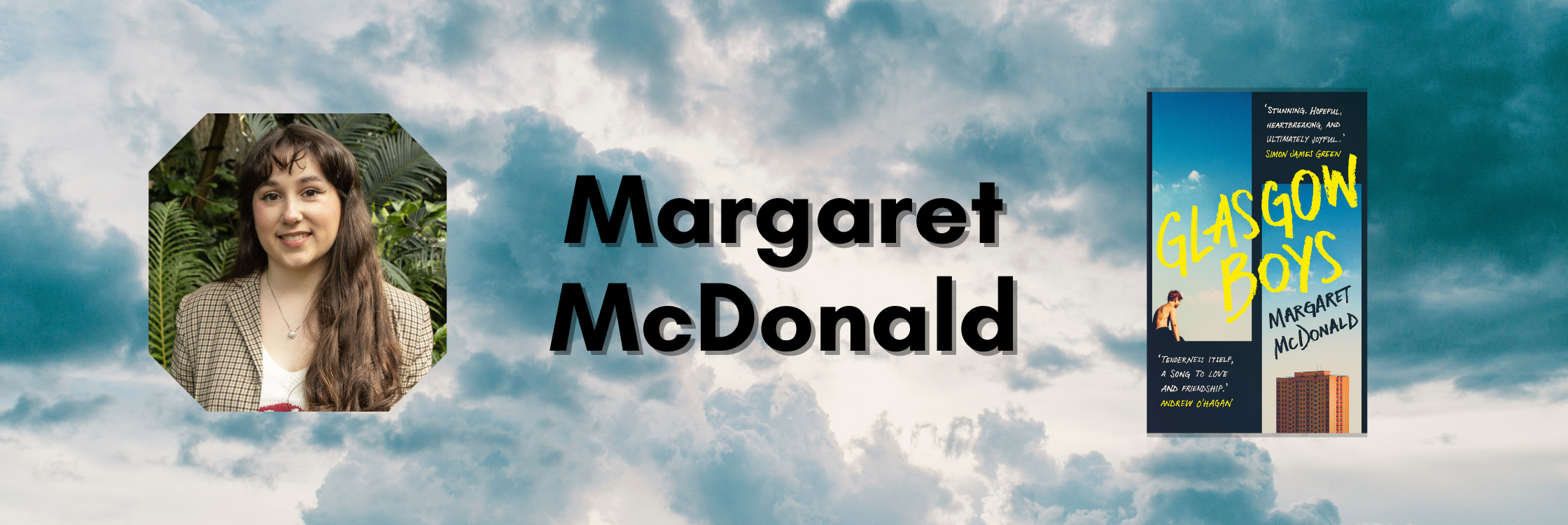
In the lead up to Camp YA we’re chatting to some wonderful authors about their books, life and Camp spirit! We headed over to Glasgow to talk to Carnegie, UKLA and Branford Boase award winner Margaret McDonald about her book Glasgow Boys. Which is a striking debut exploring the power of identity, community and the Scottish working class. This coming-of-age story is an incisive look at young masculinity and the way even the most fraught childhood is not without hope.
You transitioned from fanfic to your own personal fic, what fandoms were you a part of and what was that change like?
I won’t reveal the fandoms as I was part of, haha, as I decided to allow my fics to still exist – mainly because I understand the pain of returning to much loved fics only to find them deleted, and I get so many messages from people who re-read mine for comfort or entertainment. One message that still stays with me is from a reader who read my fic five times in a row and it helped them learn English, but for a while they spoke in that character’s style… so wild, and genuinely touching. Sometimes I feel like my fanfic is some good karma I put out into the world, and for that reason I am very proud of it. 622k words over 8 years is a mean feat. Fanfiction I think made me a writer because I realised through fic that stories could be genuinely anything I wanted. Fanfic is very subversive of traditional narratives, it doesn’t tend to follow any rules on pacing and plot, and for that reason it was so refreshing to me – a student of English Literature and Creative Writing. But I was always a writer of my own stories. I think fanfic gave me the tools, stamina, and confidence to really pursue those stories, and craft them to be what I wanted. But I see original fiction and fanfiction as very separate mediums, and don’t necessarily think of ‘transitioning’ as becoming ‘good enough’ to write my own stories, but moving from one medium to another.
You talk about curiosity as a tool, what inspires you, where do you find curiosity and how do you explore it?
I don’t really know how I find curiosity, I would say that I try to live very sensitively and very curiously, and be engaged in the world around me, and that often sparks ideas. Anything can inspire you if you are engaged enough, and listening closely, and feeling deeply. My life has been marked mainly by my passions – and that includes my hyperfixations on Yuri on Ice. I still remember the total joy I felt watching that show, genuinely kicking my feet and squealing. I am always chasing that feeling, including in my own work. I am always chasing the emotion. I think emotions are probably one of the most compelling and fascinating things in the world!
The inclusion of Alena’s Crohn’s disease felt important, when you include something so personal how do you define the balance of how much you want to give of your experiences over creating a narrative and why was this important to do so?
I would say the balance comes naturally; when you are writing, you are choosing what to reveal and what to retain. I didn’t show the agony of Crohn’s disease in Glasgow Boys, but I have written about it. Crohn’s disease is the worst thing to ever happen to me. (TW, CW) I have had several bowel obstructions and have vomited feces before. I didn’t really know it was possible to scream from pain without being shot or stabbed or something dramatic. But you can absolutely scream from the pain of Crohn’s. As you can probably tell, none of that would have had a place in Glasgow Boys. So really it was more a question of narrative purpose and tone, as opposed to what I was willing to reveal to readers. Because I will talk to anyone plainly about Crohn’s, because I think that leads to more discussion and openness around the topic, and less stigma and shame.
What was your experience and why was it important to work with sensitivity readers to create authentic representations in the work?
It was vital to depict the care experienced community authentically and sensitively, as it was their stories I was telling. I would recommend anyone do this when writing about an experience they haven’t been through.
Identity and displacement are conversations that we’re now having front and center in the media. Why was it important for you to have them here as well?
Without going into too much detail, please forgive me, but in short: empathy and kindness are our greatest gifts, they have given us everything in the world, and we are geared towards being kind and building community. I do believe in the goodness of people and I believe we can change, both on an individual and societal level.
Implicit throughout are the invisible barriers, here made visible, what did you want readers to take away from these conversations?
This is a very hard question to answer because it was the work of the entire novel. Mainly that life is more difficult when the world you inhabit isn’t built for you, and there are endless ways in which this can be true. I’m multiply disabled, I’m working-class, I’m feminine-presenting, not to discuss my sexuality or gender as those are personal to me. But those are only a few reasons why I experience barriers in the world. So I wanted people to take away a new understanding of this and through that more empathy.
Setting is important. I think everyone has an idea of what they imagine Glasgow to be like to grow up in. What was your experience and what aspects of that did you want to bring into the novel or focus the narrative on?
I think you are right, Glasgow is very much stereotyped in the media, and so it was important to me to showcase the Glasgow I know and love, that I grew up being so fascinated with. Glasgow has so much life, colour, personality, it’s so multicultural and celebratory of that fact. Glasgow also has a strong working-class identity and has always honoured that as well, and Glaswegians are very protective of their own. Two Glaswegians could meet anywhere in the world, and instantly know each other from accent alone and be fast friends. I won’t say there are no issues in Glasgow: Glaswegians (and Scottish people) are also deeply divided, but I wanted to focus on the things I adore about my city.
If you could give Banjo and Finlay one piece of advice what would it be?
I don’t think I would be so self-righteous as to give them advice, and I also don’t think they’d ever take it point-blank, haha. I think advice would have to come very gently and softly from someone very, very close to them. Essentially what they receive throughout the novel: ask for help, let people in. But that is the work of 70k to get there…
What would their favourite camp activities be?
Banjo would for sure love that American style capture the flag sport, he would absolutely have a lot of fun and get overly involved and a bit maniacal. I cannot picture Finlay having fun at camp. I think he’d be a great camp leader and would probably have cups of tea with the homesick kids.
What was your experience of the whole process, from being Carnegie nominated to then winning?
I do hate to sound cliché but it has completely changed my life. I can’t really explain how, but there were two eras / stages of my life, one where I hadn’t won the Carnegie and now the one where I have. Sometimes I stop in the street and remember that I won. I actually won it. I don’t know when that will stop.
What have the responses from the readers been like?
More than I ever dreamed possible.
We love that you donated your award winnings to Action for Children, what made you choose this charity?
I decided to donate the winnings so that Glasgow Boys would become a force for good in the world, and make a real life impact to those who are care experienced. AFC is an incredible charity that helps kids both in and out of care, alongside other vulnerable kids like those experiencing poverty, homelessness, and many other issues. Also, my partner has worked for AFC for many years, which partly inspired the novel.
Glasgow Boys is published by Faber & Faber in the UK.
Thank you to Margaret McDonald for answering our questions!


